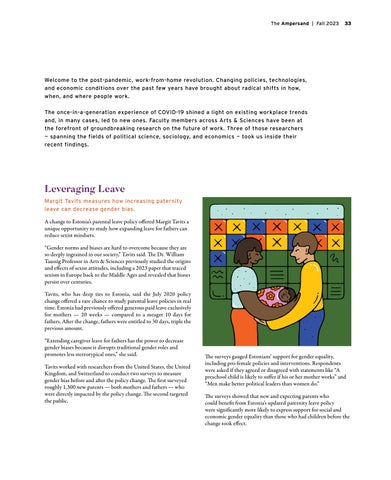The Ampersand | Fall 2023
33
Welcome to the post-pandemic, work-from-home revolution. Changing policies, technologies, and economic conditions over the past few years have brought about radical shifts in how, when, and where people work. The once-in-a-generation experience of COVID-19 shined a light on existing workplace trends and, in many cases, led to new ones. Faculty members across Arts & Sciences have been at the forefront of groundbreaking research on the future of work. Three of those researchers — spanning the fields of political science, sociology, and economics — took us inside their recent findings.
Leveraging Leave Margit Tavits measures how increasing paternity leave can decrease gender bias.
A change to Estonia’s parental leave policy offered Margit Tavits a unique opportunity to study how expanding leave for fathers can reduce sexist mindsets. “Gender norms and biases are hard to overcome because they are so deeply ingrained in our society,” Tavits said. The Dr. William Taussig Professor in Arts & Sciences previously studied the origins and effects of sexist attitudes, including a 2023 paper that traced sexism in Europe back to the Middle Ages and revealed that biases persist over centuries. Tavits, who has deep ties to Estonia, said the July 2020 policy change offered a rare chance to study parental leave policies in real time. Estonia had previously offered generous paid leave exclusively for mothers — 20 weeks — compared to a meager 10 days for fathers. After the change, fathers were entitled to 30 days, triple the previous amount. “Extending caregiver leave for fathers has the power to decrease gender biases because it disrupts traditional gender roles and promotes less stereotypical ones,” she said. Tavits worked with researchers from the United States, the United Kingdom, and Switzerland to conduct two surveys to measure gender bias before and after the policy change. The first surveyed roughly 1,300 new parents — both mothers and fathers — who were directly impacted by the policy change. The second targeted the public.
The surveys gauged Estonians’ support for gender equality, including pro-female policies and interventions. Respondents were asked if they agreed or disagreed with statements like “A preschool child is likely to suffer if his or her mother works” and “Men make better political leaders than women do.” The surveys showed that new and expecting parents who could benefit from Estonia’s updated paternity leave policy were significantly more likely to express support for social and economic gender equality than those who had children before the change took effect.















